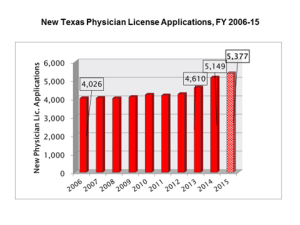A bit of old news, Executive Director Mari Robinson left the Texas Medical Board submitting her resignation in September 2016. In announcing her resignation Ms. Robinson attempted to put rumors to rest, “I want to reassure you that there is nothing negative behind my decision to leave nor is there anything bad coming down the pike,” Robinson said in a statement released Tuesday to staff and board members. “While there maybe be gossip about this, there is absolutely no truth to anything like that. Honestly, I am just ready to try something new and I am excited about this opportunity.”
Initially I was shocked to learn of Mari’s resignation as were many physicians who were lighting up the Garanflo and Meyer phones. Also, the Texas Medical Board was headed into Sunset hearings before the 2017 Texas Legislative session and the Teladoc lawsuit had still not been resolved – BUT, the more I thought about it the more it made sense. There is probably not anyone in the state of Texas that knows more about how Telemedicine should look in Texas and heading up UTMB Gavleston’s Telehealth program is a good fit.
Jaime and I wish Mari the best and know that she will work hard to make UTMB’s program the best in the state.
